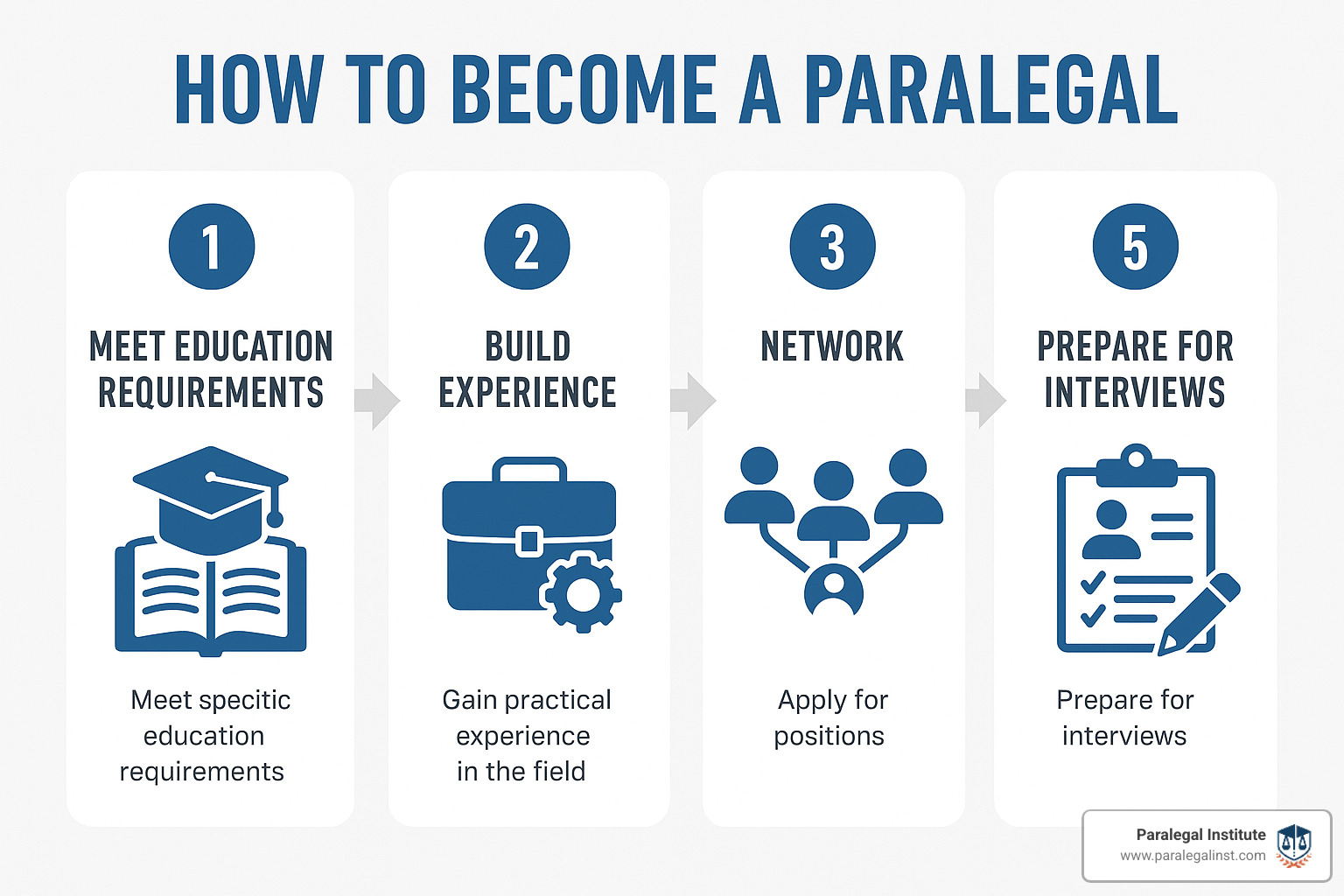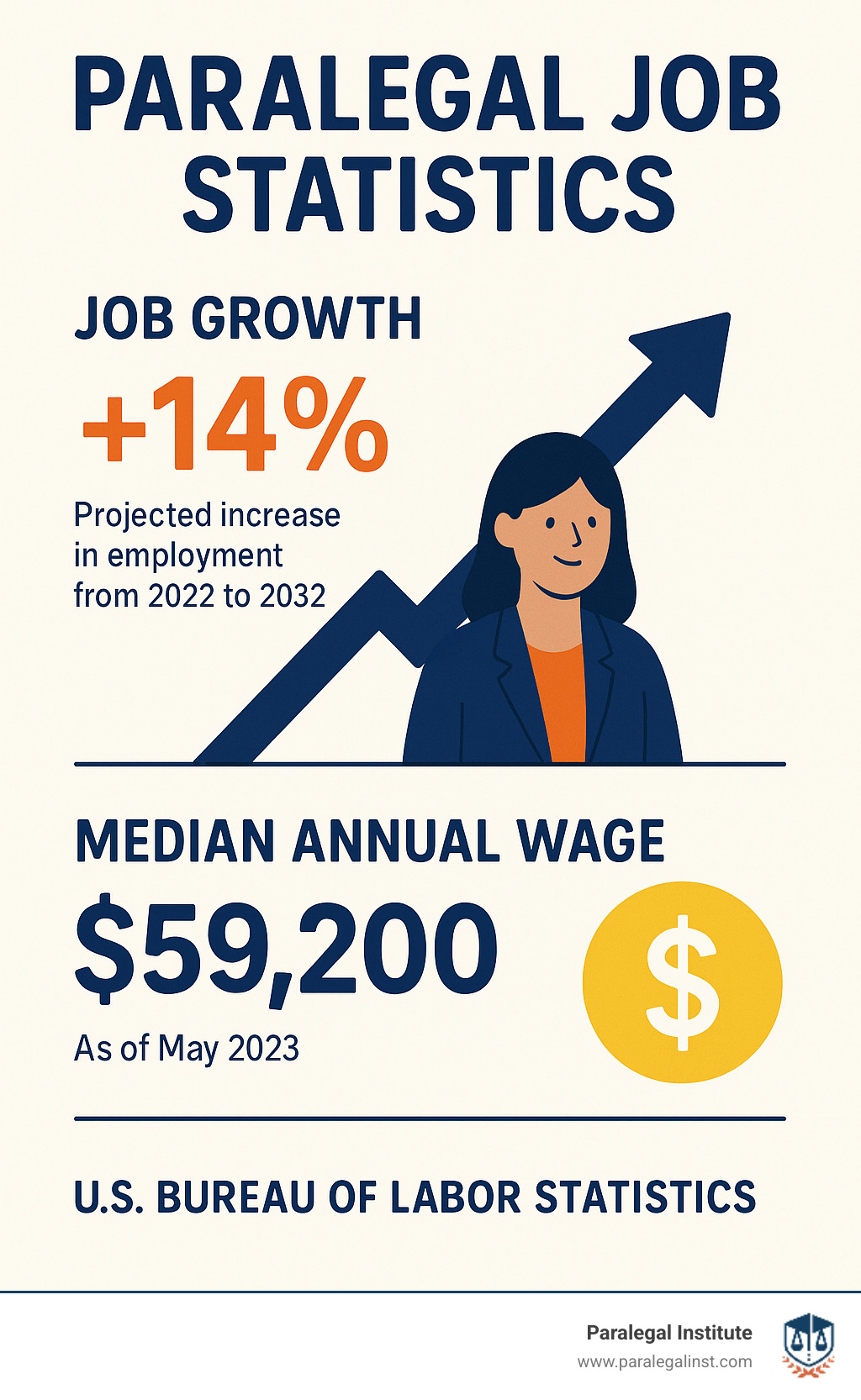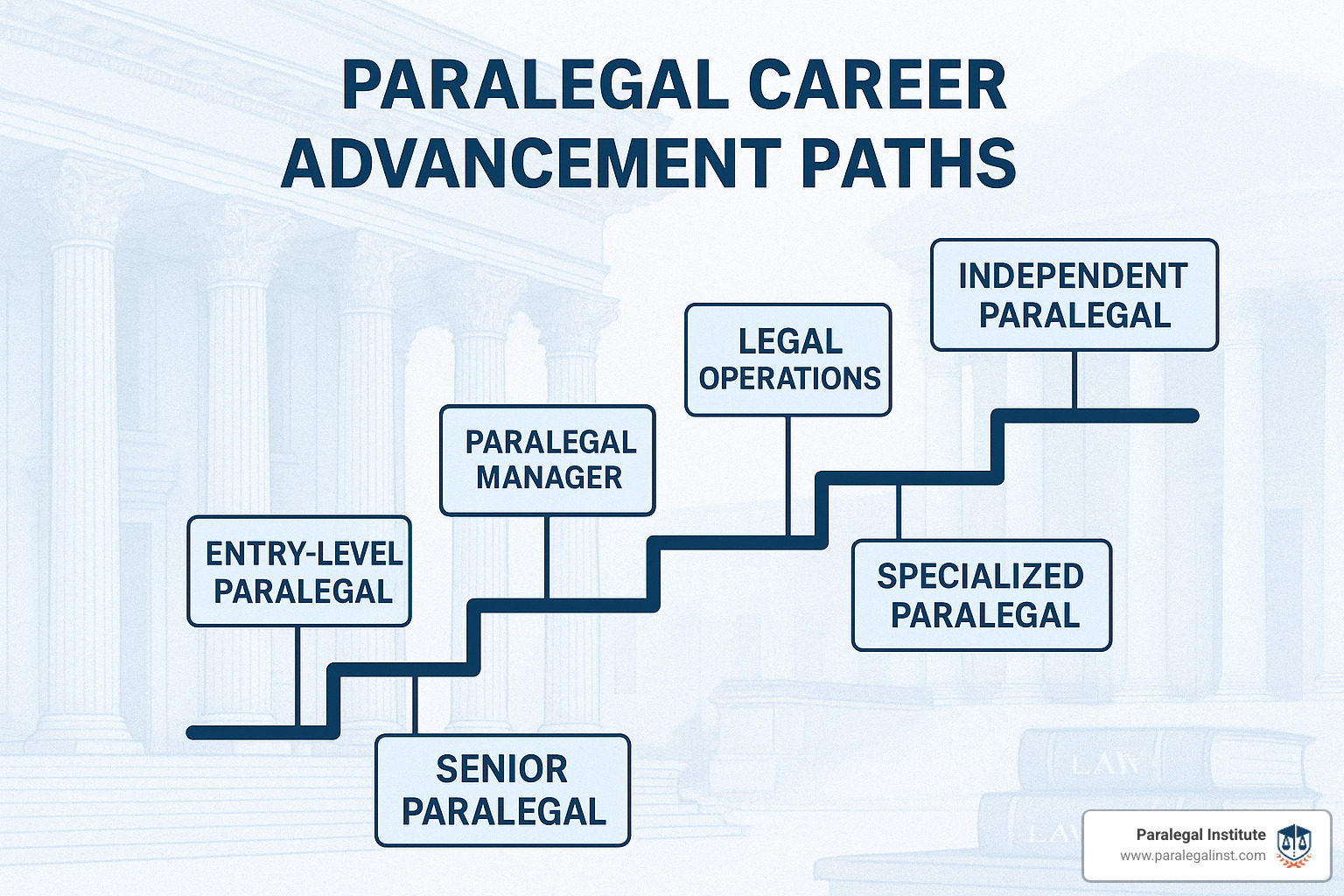Breaking into Law: Your Step-by-Step Guide to Getting a Paralegal Job
Breaking into the Legal Field: Your Roadmap to Success
If you're wondering how to get paralegal job opportunities, here's a quick overview of the essential steps:
- Earn a paralegal certificate through an accelerated program
- Gain practical legal experience through internships or entry-level positions
- Network with legal professionals through associations and mentorship
- Develop key skills in legal research, writing, and technology
- Create targeted application materials for each position
- Prepare thoroughly for interviews with practice questions
The path to becoming a paralegal doesn't have to be complicated or take years to complete. With strategic planning and the right training, you can launch your legal career without the time and expense of a four-year degree.
Paralegals serve as the backbone of the legal profession, performing critical tasks that keep law firms running smoothly. While attorneys handle courtroom arguments and client consultations, paralegals work behind the scenes conducting research, drafting documents, managing case files, and coordinating with clients. This creates an excellent entry point into the legal field with strong growth potential.
According to the Bureau of Labor Statistics, there are approximately 37,300 paralegal job openings projected each year through 2033. The median annual wage for paralegals was $61,010 in 2024, making this an attractive career path for those seeking professional growth without extensive education requirements.
As Matthew Pfau, I've spent years hiring and training paralegals for my law firm, giving me insight into how to get paralegal job opportunities and what employers are truly seeking in candidates. My experience has shown that practical skills and the right certificate can be more valuable than lengthy academic programs.

Why This Guide Matters
The legal industry faces a significant support gap as law firms seek qualified paralegals who can hit the ground running. With 37,300 openings projected annually, there's substantial opportunity for those who prepare correctly. What makes this guide particularly valuable is our focus on accelerated entry strategies that help you bypass unnecessary educational detours.
As Christy Torrelli, a successful paralegal who transitioned from dental hygiene, noted: "A certificate will get you in the door…but doesn't define what the expectations are of the individual firm." Our guide bridges that gap, showing you exactly what firms expect and how to meet those expectations efficiently.
Paralegal Role, Must-Have Skills & Job Market
Before we jump into how to get paralegal job opportunities, let’s shed some light on what being a paralegal actually means. Paralegals are the essential, behind-the-scenes heroes of the legal world. They keep cases moving by researching legal questions, drafting important documents, organizing evidence, and helping attorneys stay on top of deadlines. You might find yourself preparing trial exhibits one minute and explaining next steps to a client the next.

Key Daily Responsibilities
On a typical day, a paralegal juggles a variety of tasks. You’ll be managing case files and making sure nothing slips through the cracks. There’s trial support —prepping exhibits, coordinating witnesses, and pitching in when attorneys head to court. Add to that e-filing, which means submitting documents through digital court systems and ensuring every “i” is dotted (sometimes literally).
A huge part of the role is client communication. Paralegals are often the first friendly face (or friendly email) a client encounters. Whether you’re answering questions, collecting details for a case, or giving updates (always under an attorney’s direction), great communication is a must. Fun fact: up to 80% of a paralegal’s day involves talking or writing to someone! If you like variety and staying organized, you’ll fit right in.
Essential Skill Set
Wondering what skills employers look for when searching for how to get paralegal job candidates? You don’t need to memorize every law, but you do need to bring your best skills to the table. Organization tops the list—think color-coded calendars, not sticky notes lost under your coffee mug. Attention to detail is crucial, because a simple error in a legal document can cause big headaches.
You’ll also need legal research skills, confidently navigating databases and uncovering the laws and cases that matter. Technical proficiency is more important than ever, thanks to legal software and e-filing systems. And don’t forget your communication abilities: clear writing, professional emails, and patient explanations go a long way. Strong problem-solving skills and the ability to handle tight deadlines round out your toolkit.
One attorney summed it up perfectly: “I can teach someone the law, but I can’t teach attention to detail or a strong work ethic.” Bring that attitude, and you’ll stand out.
Where the Jobs Are
Knowing where to look is half the battle. About 75% of paralegals work in law firms, handling everything from real estate deals to big court cases. But that’s not your only option. Many paralegals find rewarding careers in corporate legal departments, which often offer steady hours and good benefits. There are also opportunities in government agencies —federal, state, and local—where job stability and public service go hand in hand. Non-profits also need paralegals for advocacy, community outreach, and direct client support.
(Source: Occupational Employment and Wage Statistics )
Tech is changing the landscape, too. Artificial intelligence tools now help with things like document review and legal research. But don’t worry— the human touch remains irreplaceable. Paralegals are still needed to connect with clients, spot red flags, and keep everything running smoothly.
At the Paralegal Institute, we know that today’s job market rewards those who are adaptable, tech-savvy, and detail-oriented. If you’re ready to learn, grow, and make a difference, getting your paralegal certificate can be the launchpad to a stable and rewarding career.
How to Get Paralegal Job: 7-Step Roadmap
Now that you understand the role and required skills, let's break down the specific steps to land your paralegal position.

Step 1 – Decide on Practice Area
While entry-level paralegals often work as generalists, having an interest in specific practice areas can help focus your job search:
- Litigation: Supporting attorneys with court cases from filing to trial
- Real estate: Assisting with property transactions and title research
- Corporate: Helping with business formations, contracts, and compliance
- Intellectual property: Supporting patent, trademark, and copyright matters
- Family law: Assisting with divorces, custody, and support issues
- Personal injury: Helping injured clients seek compensation
- Estate planning: Supporting creation of wills, trusts, and probate matters
"Step one is incredibly important in your job-hunting journey," advises a legal recruiter, "because you don't want to waste your time searching, applying, and interviewing for a position you don't actually want."
Step 2 – Earn a Paralegal Certificate
A paralegal certificate is the most efficient path to qualify for paralegal positions. At the Paralegal Institute, our 15-week program focuses on practical skills that employers value, including:
- Legal terminology and procedures
- Research and writing techniques
- Document preparation and filing
- Case management and organization
- Legal technology and software
Our accelerated program is designed by practicing legal professionals who understand exactly what skills new paralegals need to succeed from day one. Classes are available both online and in-person at our Las Vegas location to accommodate different learning preferences and schedules.
Step 3 – Master Core Skills While Studying
While completing your paralegal certificate, focus on developing these essential skills:
- Legal research: Learn to steer legal databases like Lexis and Westlaw efficiently
- Writing: Practice drafting clear, concise legal documents and correspondence
- Technology: Become proficient with word processing, spreadsheets, and legal software
- Organization: Develop systems for tracking deadlines and managing multiple tasks
- Communication: Hone professional email and phone etiquette
"A degree will get you in the door," notes one experienced paralegal, "but doesn't define what the expectations are of the individual firm." That's why hands-on skill development is crucial.
Step 4 – Complete an Internship or Clinic
Practical experience is invaluable for landing your first paralegal job. Consider these options:
- Internships: Many law firms offer internship opportunities for paralegal students
- Legal clinics: Volunteer at legal aid organizations or pro bono clinics

Step 5 – Build a Professional Network
The legal community is relationship-driven, making networking essential for how to get paralegal job opportunities:
- Join local paralegal associations and attend meetings
- Create a professional LinkedIn profile highlighting your skills
- Connect with attorneys and paralegals in your desired practice area
- Seek a mentor who can provide guidance and possibly job referrals
- Attend legal community events and continuing education seminars
"If you don't go after what you want, you'll never have it," is a principle that applies perfectly to paralegal networking. Be proactive in building connections.
Step 6 – Target Job Boards & Hidden Markets
When ready to apply, cast a wide net:
- Specialized job boards: Sites focusing on legal careers often have exclusive listings
- Legal temp agencies: Firms like Robert Half & Associates place paralegals in temporary roles that can become permanent
- Direct applications: Research law firms in your area and submit applications even without posted openings
- Courthouse bulletin boards: Some smaller firms still post physical job notices
- LinkedIn job alerts: Set up notifications for paralegal openings in your area
One strategic approach is using temporary assignments as a foot in the door. "Two to three months per assignment is ideal," advises a legal recruiter, ensuring the temp process doesn't exceed one year before seeking permanent roles.
Step 7 – Keep Learning Post-Hire
Once hired, continue developing your skills to advance your career:
- Attend continuing legal education webinars
- Pursue specialty workshops in your practice area
- Master new legal technologies as they emerge
- Observe experienced paralegals and attorneys
- Ask questions and seek feedback on your work
Gain Experience, Network & Apply Strategically
Many people searching for how to get paralegal job opportunities face a classic catch-22: “How do I get experience if every job requires experience?” The good news is there are smart ways to break in—even if you’re starting at square one.

Turning Entry Roles into Paralegal Experience
If you’re just getting started, don’t worry— every legal career starts somewhere. Entry-level roles like legal secretary, legal assistant, receptionist, file clerk, or court runner are often the first step. These jobs give you a front-row seat to the legal world and teach you real skills you’ll use as a paralegal.
For example, working as a legal assistant or receptionist means you’ll handle calls, greet clients, and help organize schedules. A file clerk may be in charge of keeping documents in order, while a court runner gets a behind-the-scenes look at how filings and deliveries work. Even a job as a document preparer gives you hands-on experience formatting and managing important paperwork.
The secret? Say yes to new responsibilities. Learn legal words and office routines, watch how lawyers and paralegals talk to clients, and ask to help with calendar management or drafting letters. Every phone call, email, and file you handle is valuable practice. As one successful paralegal put it, “I started as a receptionist at a personal-injury firm, but every time there was a chance to volunteer for extra tasks, I took it—and that opened new doors.”
Networking & Mentorship Hacks
When it comes to how to get paralegal job offers, who you know really does matter. The legal community is close-knit, so start making connections early. Don’t just sit quietly at paralegal association meetings— join a committee or help organize events. You’ll get to know working paralegals and attorneys in a friendly setting.
Another smart move? Arrange informational interviews with experienced paralegals. Most people love to share their career stories, and you’ll pick up advice you can’t find in textbooks. If you’ve earned your paralegal certificate already, connect with alumni from your program—they’re often happy to help newer graduates find their footing.
You’ll also find great networking opportunities by volunteering at legal aid clinics or attending courthouse events. Not only do you gain experience, but you’ll meet legal professionals who might later recommend you for jobs. And don’t forget about mentors: Whether it’s an instructor from The Paralegal Institute or a senior paralegal you meet at work, a mentor can offer career guidance and introduce you to others in the field.
As one legal career advisor simply puts it: “Network, network, network.” Word travels fast in legal circles—and a good impression can lead to your next opportunity.
Finding Unadvertised Openings
Here’s a secret: Many paralegal jobs never make it to public job boards. Law firms often fill positions through referrals and word-of-mouth before even posting an ad. That’s why your relationships matter.
To find these hidden opportunities, build relationships with legal recruiters—let them know you’re actively searching. Drop off your resume in person at law firms nearby (yes, old-school still works). Keep an eye out for job postings on courthouse bulletin boards; smaller firms sometimes still use them.
Don’t hesitate to ask attorneys or paralegals in your network if they know of any openings. Sometimes, just being quick on the draw makes a difference—a successful job-seeker shared, “I always submit my resume within hours of a job being posted, before the inbox floods. It really works!”
The bottom line: Stay proactive and visible in the legal community, and you’ll find opportunities that aren’t advertised anywhere else.

Breaking into a paralegal role may take creativity and persistence, but every step—whether it’s answering phones, joining an association, or helping out at a legal clinic—moves you closer to your goal. Your how to get paralegal job journey is about building real skills, making connections, and being ready when opportunity knocks.
Applications & Interviews That Stand Out
Creating standout application materials isn't just a good idea—it's essential when you're competing against dozens of other candidates for paralegal positions. Let's talk about how to make hiring managers notice you from the first glance at your resume.
Resume Blueprint for "How to Get Paralegal Job" Success
Your resume is your first impression, and in the legal field, details matter tremendously. One hiring manager told me, "A single typo on a paralegal resume can eliminate you from consideration, as attention to detail is crucial in legal work."
To create a resume that opens doors:
Highlight your relevant skills prominently in a dedicated "Skills" section near the top. This gives busy hiring managers an immediate sense of your capabilities. Include both technical skills (like proficiency with Westlaw or LexisNexis) and soft skills (like client communication).
Incorporate keywords from the job description to ensure your resume passes through automated tracking systems. Many firms use these systems to filter applications before a human ever sees them.
Whenever possible, quantify your achievements with specific numbers. Instead of saying you "managed case files," specify that you "managed 50+ active case files simultaneously while meeting all court deadlines." This concrete information helps employers visualize your capabilities.
Don't forget to showcase all relevant experience, even if it wasn't in a formal paralegal role. Internships, volunteer work at legal clinics, and even transferable skills from other industries can demonstrate your readiness for paralegal work.
Be specific about your software proficiencies, especially with legal-specific programs. Knowledge of case management software, e-filing systems, or document management tools can set you apart from other candidates.
Finally—and I can't stress this enough—ensure your resume is absolutely error-free. In a profession where a misplaced comma can change the meaning of a contract, your attention to detail starts with your application materials.
Common Interview Questions & Winning Answers
Once your stellar resume lands you an interview, preparation becomes your best friend. Here are some questions you're likely to face, along with approaches to answering them effectively:
When asked why you decided to pursue a paralegal career, focus on your analytical abilities and organizational strengths rather than just interest in law. A compelling answer might be: "I've always been drawn to the legal field because of my strong analytical skills and attention to detail. I chose the paralegal path specifically because I enjoy the hands-on aspects of case management and research, and I value being part of a team that helps clients steer complex legal situations."
For questions about prioritizing multiple urgent tasks, employers want to see your decision-making process. A strong response demonstrates your understanding of legal deadlines: "I assess deadlines and consequences of delay for each task. Court filings with statutory deadlines take top priority, followed by time-sensitive client matters. I communicate clearly with supervising attorneys about my workload and any potential conflicts, and I'm not afraid to ask for guidance on prioritization when needed."
When describing your legal research process, show both your technical knowledge and methodical approach: "I start by clarifying the exact question that needs answering and identifying key terms. I then use appropriate research tools like Westlaw or Lexis to find relevant statutes and cases. I analyze the findings for relevance and precedential value, and I present my research in a clear, organized format with proper citations."
For handling difficult client scenarios, emphasize both empathy and professionalism: "I would listen actively to understand their concerns, maintain a calm, professional demeanor, and acknowledge their frustration. I'd clarify what I can help with directly and what requires attorney involvement. Throughout, I'd document our interactions and keep supervising attorneys informed of any issues."
Salary & Negotiation Basics
When it comes to actual negotiation, remember these principles:
Focus on value rather than personal financial needs. Discuss the skills and contributions you'll bring to the firm instead of your rent or student loans.
Consider the total package, not just the salary number. Benefits like health insurance, retirement contributions, paid time off, and professional development opportunities can add significant value.
Use market research to support your requested salary range. Being able to reference average salaries for paralegals with your qualifications in your specific location shows you've done your homework.
And remember the old negotiation wisdom: "He who speaks first loses." When possible, let the employer make the first offer rather than volunteering your desired salary prematurely.
At the Paralegal Institute , our career services team works with students on these exact skills—creating standout applications and preparing for interviews that showcase both technical knowledge and professional polish.
Interview Success, Salary Negotiation & Growth Paths
Once you've landed interviews, proper preparation becomes your secret weapon for turning those conversations into how to get paralegal job offers.
Advancing Beyond Entry Level
After establishing yourself as a valuable paralegal, several exciting career paths open up:
The journey doesn't stop at your first paralegal role. Many professionals find themselves naturally progressing to Senior Paralegal positions where they handle complex cases and often mentor newer team members. Others find leadership talents and move into Paralegal Manager roles, overseeing teams in larger firms.
"If you don't ask, the answer will always be no," shares one paralegal who advanced her career by simply requesting her firm sponsor additional training. This proactive approach exemplifies how initiative drives advancement in the legal field.
Some paralegals leverage their expertise to become specialists in specific practice areas, while others transition into Legal Operations roles where they optimize firm processes and technology implementation. For those with an entrepreneurial spirit, working as an Independent Paralegal for multiple attorneys offers flexibility and variety.
Each advancement path typically brings increased responsibility, higher compensation, and greater professional satisfaction. The key is identifying which route aligns with your strengths and interests.

Specialization Routes
Developing expertise in high-demand practice areas significantly boosts your marketability and earning potential. Litigation paralegals remain in constant demand, supporting attorneys through every phase of the trial process from initial filings to courtroom procedures.
Personal injury specialization offers rewarding work helping injured clients steer compensation claims, while those with analytical minds might gravitate toward corporate compliance roles ensuring businesses meet complex regulatory requirements.
Tech-savvy paralegals often find fulfilling careers in intellectual property, assisting with patents, trademarks, and copyright matters. Those passionate about helping others might consider immigration specialization, where they guide clients through life-changing legal processes.
At the Paralegal Institute, our curriculum includes specialized training in many of these areas, helping you develop the marketable expertise employers seek. Our Paralegal Skills Certification program specifically targets these high-demand specialties.
Long-Term Outlook & Emerging Tech
While the Bureau of Labor Statistics projects national paralegal employment growth at a modest 1% from 2023 to 2033, certain markets tell a different story. New York, for instance, anticipates much stronger growth (7.2% from 2022-2032), highlighting the importance of location in your career planning.
Technology continues reshaping the paralegal profession in fascinating ways. Rather than replacing paralegals, these innovations are changing how we work. AI-assisted document review speeds up previously tedious tasks, while electronic filing systems have virtually eliminated paper-heavy processes in many jurisdictions.
Virtual collaboration tools have made remote paralegal work increasingly common, offering flexibility previously rare in legal careers. Meanwhile, automated case management systems streamline organization and deadline tracking.
The most successful paralegals accept these technologies rather than resist them. As one industry expert colorfully puts it, "Paralegals should be the 'go-to' person for AI and new technologies in their firms." This adaptability ensures your skills remain relevant in an evolving legal landscape.
The key to long-term success lies in continuous learning and flexibility. By staying current with emerging technologies while building on traditional paralegal skills, you'll position yourself as an indispensable asset to any legal team—regardless of how the profession evolves.
FAQs & Conclusion

As you prepare to launch your paralegal career, you likely have some lingering questions. Let's address the most common ones that aspiring legal professionals ask when figuring out how to get paralegal job opportunities.
How long does it take to complete a paralegal certificate?
Our accelerated program at the Paralegal Institute can be completed in just 15 weeks—about one semester of focused study. We've designed this timeline deliberately to get you job-ready without unnecessary academic detours.
We understand many students are balancing family responsibilities, current jobs, or other commitments, which is why we offer flexible pacing options. Whether you attend classes at our Las Vegas location or choose our online format, we've created a program that fits into real lives, not the other way around.
Do I need a paralegal certificate to start, or can I learn on the job?
While some paralegals from previous generations learned exclusively on the job, today's legal market strongly favors candidates with formal training. As one hiring manager colorfully put it, "Finding a law firm that hires paralegals without training is like spotting a commuting unicorn."
The certificate serves as tangible proof of your commitment to the profession and signals to employers that you understand legal terminology, research methods, and document preparation. In competitive job markets like New York, where hundreds of candidates might apply for a single position, having a paralegal certificate isn't just preferred—it's often required to make it past the initial resume screening.
That said, your certificate is just the beginning of your learning journey. The most successful paralegals continue building their knowledge throughout their careers, combining formal education with practical experience.
What's the fastest way to gain experience if I can't land an internship?
Not everyone can secure a traditional internship, but there are creative alternatives for gaining that crucial first legal experience. Volunteering at legal aid clinics provides hands-on exposure to real cases while helping those who can't afford legal representation. Many of our graduates have found these volunteer opportunities through local bar associations or courthouse resource centers.
Temporary staffing agencies specializing in legal placements can be another excellent entry point. These agencies often place candidates in short-term positions that require less experience but provide valuable exposure to legal environments. Many permanent hires begin as temporary employees who impressed their firms.
Other effective strategies include taking entry-level positions like file clerk or legal receptionist, volunteering as a Court Appointed Special Advocate (CASA), or creating a portfolio of sample legal documents(with all identifying information removed) to demonstrate your skills.
"I started as a courthouse runner," recalls one successful paralegal. "The pay wasn't great, but I met attorneys daily, learned the filing system inside and out, and eventually got hired by a firm I regularly delivered to."
Final Takeaway & Next Step
The path to becoming a paralegal doesn't need to be complicated or lengthy. With strategic planning and practical training, you can launch your legal career more quickly than you might expect. The key ingredients are a quality paralegal certificate, relevant experience (even if unconventional), professional networking, and targeted applications.
At the Paralegal Institute, we specialize in preparing students for immediate workforce entry through our 15-week certificate program. Our curriculum is crafted by practicing legal professionals who understand exactly what skills new paralegals need to succeed from day one. We don't just teach theory—we build practical competencies that employers value.
The legal field offers stable, rewarding careers with strong earning potential and diverse opportunities. Whether you're changing careers after years in another field or just starting your professional journey, the paralegal path provides an excellent entry point into the legal world without the time and expense of law school.
Ready to take the first step toward your paralegal career? Learn more about our courses and how we can help you achieve your professional goals at the Paralegal Institute.










